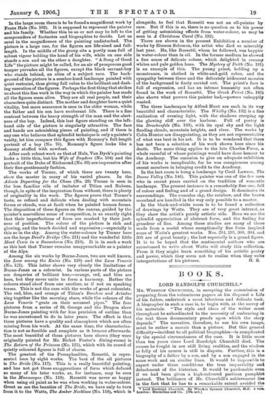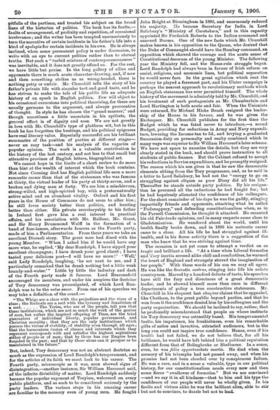BOOKS.
LORD RANDOLPH CHURCHILL.*
MR. WraTeroN CHURCHILL, in accepting the commission of preparing from the voluminous papers at his disposal a Life of his father, undertook a most laborious and delicate task. A biographer in such a case is, to begin with, at the mercy of his materials. "The style and ideas of the writer must throughout be subordinated to the necessity of embracing in the text those documentary proofs upon which the story depends." The narrative, therefore, to use his own image, must be rather a mosaic than a picture. But this general difficulty—incident to all political biographies—is complicated by the special circumstances of the case. It is little more than ten years since Lord Randolph Churchill died. The causes be fought in are still living realities, and the wisdom or folly of his course is still in dispute. Further, this is a biography of a father by a son, and by a son engaged in the same work and on similar lines. It would be impossible to expect under these conditions the true impartiality and detachment of the historian. It would be pardonable even if we had been given a high-coloured partisan pamphlet instead. The brilliance of Mr. Churchill's achievement lies in the fact that be has to a remarkable extent avoided the • Lord Randolph Churchill. By Winstan Spencer Churchill, M.P. 2 roll. London: Macmillan and Co. Pft. net.]
pitfalls of the partisan, and treated his subject on the broad • lines of the historian of politics. The book has its faults,— faults of arrangement, of prolixity and repetition, of occasional irrelevance ; and the writer has been tempted unconsciously to • turn the narrative of certain incidents in his father's life into a
• kind of apologia for certain incidents in his own. He is always inclined, when some permanent policy is under discussion, to
write with an eye to current politics rather than to eternal truths. But such a "turbid mixture of contemporaneousness" was inevitable, and it does not greatly offend us. For the rest, we have little but praise. In the long gallery of allies and opponents there is much acute character-drawing, and, if now and then something strikes us as wrong-headed, there is nothing petty or unfair. Mr. Churchill tells the story of his father's private life with singular tact and good taste, and he has striven to make the tale of his public life an adequate history of an epoch in English politics. Few will object to his occasional excursions into political theorising, for these are
• usually germane to the argument, and always provocative of thought. In style he has chosen the "grand manner," and though sometimes a little uncertain in his epithets, the general effect is of dignity and ease. We are not greatly in love with Mr. Churchill's type of platform wit, but in this book he has forgotten the hustings, and his political epigrams have real literary value. Especially successful are his brilliant summaries of the position of parties at different stages— never an easy task—and his analysis of the vagaries of
popular opinion. The work is a valuable contribution to the history of the last century, and not less to that small but attractive province of English letters, biographical art.
• We cannot hope in the limits of a short review to do more than hint at the wealth of interest which the book contains. Not since Canning died has English political life seen a more romantic career than that of the statesman who was famous at thirty, the virtual leader of his party at thirty-seven, and a broken and dying man at forty. We see him a mischievous, strong-willed, and high-spirited boy, with a preternaturally active mind and an abundant vitality. Oxford and his first years in the House of Commons do not seem to alter him; he still loves society better than politics, and hunting better than either. His private secretaryship to his father in Ireland first gave him a real interest in practical affairs, and his association with Mr. Balfour, Mr. Gorst, and Sir Henry Drummond Wolff in the formation of a band of free-lances, afterwards famous as the Fourth party, made of him a Parliamentarian. From these years we take an
excellent Disraeli story. The great man had dined with the young Member. "When I asked him if he would have any more wine, he replied, 'My dear Randolph, I have sipped your excellent champagne; I have drunk your good claret ; I have tasted your delicious port—I will have no more!' ' Well,' said Lady Randolph, laughing, 'he sat next to me, and I particularly remarked that he drank nothing but a little weak brandy-and-water.' " Little by little the industry and dash of the Fourth party made it famous. Lord Beaconsfield encouraged its members, and under his auspices the doctrine of Tory democracy was promulgated, of which Lord Ran- dolph was to be the vates sacer. From one of his speeches we may take a definition of the creed :— " The Whigs are a class with the prejudices and the vices of a class ; the Radicals are a sect with the tyranny and fanaticism of a sect. . . . . . The Tories, who are of the people, tell you that these institutions, which are not so much the work of the genius of man, but rather the inspired offspring of Time, are the tried guarantees of individual liberty, popular government, and Christian morality; that they are the only institutions which possess the virtue of stability, of stability even through all ages ; that the harmonious fusion of classes and interests which they represent corresponds with and satisfies the highest aspirations either of people or of men; that by those has our Empire been 'founded in the past; and that by these alone can it prosper or be 'maintained in the future."
But, indeed, Tory democracy was not an abstract doctrine so much as the expression of Lord Randolph's temperament, and for the articles of its faith we must look to his career. The Fourth party, microscopic as it was, soon showed signs of
disintegration,—another instance, Sir William Harcourt said, a the infinite divisibility of matter. Lord Randolph suddenly became the popular exponent of Toryism, welcomed on every public platform, and as such to be considered seriously by the party leaders. The various steps in his amazing career are familiar to the memory even of young men. He fought
John Bright at Birmingham in 1885, and enormously reduced his majority. He became Secretary for India in Lord Salisbury's "Ministry of Caretakers," and in this capacity appointed Sir Frederick Roberts to the Indian command and annexed Burma. One of the new facts which Mr. Churchill
makes known is his opposition to the Queen, who desired that the Duke of Connaught should have the Bombay command, an opposition which showed the courage and the acute sense of Constitutional decorum of the young Minister. The following year the Ministry fell, and the Home-rule struggle began. Lord Randolph had always been in favour of Irish reform on social, religious, and economic lines, but political separation he would never face. In the great agitation which rent the country he played a foremost part, and his Ulster campaign is perhaps the nearest approach to revolutionary methods which an English statesman has ever permitted himself. The whole history of the movement is admirably told by Mr. Churchill, and his treatment of such protagonists as Mr. Chamberlain and Lord Hartington is both acute and fair. When the Unionists were returned, Sir Michael Hicks Beach resigned the leader- ship of the House in his favour, and he was given the Exchequer. Mr. Churchill publishes for the first time the Budget which he was fated never to introduce,—a sound Budget, providing for reductions in Army and Navy ex-pendi- trire, lowering the Income-tax to 5d., and levying a graduated Succession-duty on personalty and realty combined which in many ways was superior to Sir William Harcourt's later scheme. We have not space to examine the details, but they are very clearly stated in the book, and should prove instructive to all students of public finance. But the Cabinet refused to accept his reductions in Service expenditure, and he promptly resigned. The reason which his son gives is that he saw the democratic elements ebbing from the Tory programme, and, as he said in a letter to Lord Salisbury, he had not the "energy to go on struggling against cliques as poor Dizzy did all his life." Thereafter he stands outside party politics. By his resigna- tion he procured all the reductions he had fought for; but he bad hopelessly alienated the confidence of his colleagues. For the short remainder of his days he was the gadfly, stinging impartially friends and opponents, attacking what he called "Podsnappery," and defending constitutionalism when, as in the Parnell Commission, he thought it attacked. He recanted his old Fair-trade opinions, and in many respects came close to Gladstonianism. He wandered about the world, until his health finally broke down, and in 1895 his meteoric career came to a close. All his life he had struggled against ill- health, and in his fierce activity there is a suggestion of the man who knew that he was striving against time.
The occasion is not yet come to attempt a verdict on so tragic and brilliant a life. "At a time when Liberal formulas and Tory inertia seemed alike chill and comfortless, he warmed the heart of England and strangely stirred the imagination of her people." With these words of his son we may all agree. He was like the Socratic oestrus, stinging into life his sedate countrymen. Marred by a hundred defects of taste, his speeches have still the fury and directness of a great democratic leader, and he showed himself more than once in different departments of policy a true constructive statesman. Mr. Churchill in his eloquent last chapter claims that he appealed, like Chatham, to the great public beyond parties, and that he won from it the confidence denied him by his colleagues and the party organisation. We should be inclined to say, rather, that he profoundly misunderstood that people on whose instincts his Tory democracy was ostensibly based. His temperamental faults, his impatience, his freakishness, even his remarkable gifts of satire and invective, attracted audiences, but in the long run could not inspire true confidence. Hence, even if his health had not failed, we do not believe that, for all his brilliance, he would have left behind him a political reputation different from that of Bolingbroke or Shelburne. In a sense, even, he was fells oppcniunitate mortis. He died when the memory of his triumphs had not passed away, and when his promise had not been clouded over by conspicuous failure. He was a rare, and in a sense a valuable, type in our political history, for our constitutionalism needs every now and then some fierce "swallower of formulas." But we are convinced —and we say it in all kindness—that to him and his type the confidence of our people will never be wholly given. In his faults and virtues alike he was the brilliant alien, able to stir but not to convince, to dazzle but not to lead.



















































 Previous page
Previous page